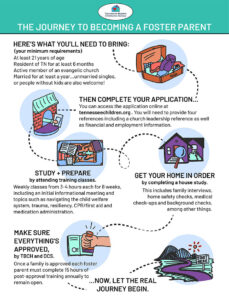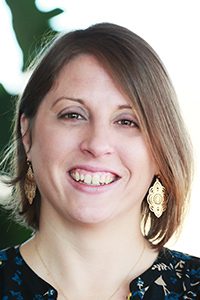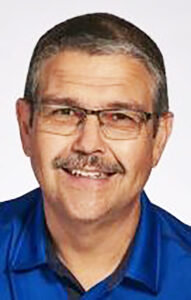 FRANKLIN — Educating and helping church members understand the critical need for foster parents is an important element of compassion ministry, according to Beth Moore.
FRANKLIN — Educating and helping church members understand the critical need for foster parents is an important element of compassion ministry, according to Beth Moore.
“Tennessee Baptist compassion ministries exist to serve churches as churches serve others,” said Moore, compassion ministries specialist for the Tennessee Baptist Mission Board.
“Churches serve their communities by meeting needs to build relationships and share the gospel. One overwhelming need across our state right now is foster parents for children in the foster care system,” she said.
“As believers we know that pure religion is to care for the orphan. I believe that many of our Tennessee Baptist churches are just unaware of the need,” she observed.
In order to bring the need to the attention of Tennessee Baptists, Moore recently hosted a webinar with staff from the Tennessee Baptist Children’s Homes, including Kelly Campbell, vice president of family care for TBCH.
“This webinar allowed us to talk about this need and highlight some of the work TBCH does with children in foster care,” Moore noted.
Foster care is a large issue in the state of Tennessee, Campbell affirmed. “We want to let the churches know what we’re doing to impact that issue and how churches can help by providing foster families and help for those foster families through their churches,” he said.
Though TBCH still provides residential care in three regions of the state, foster care is needed all across the state, said Laurie Gardner, chief program officer for TBCH.
TBCH began providing foster care services in 2013. To date, they have trained hundreds of foster parents and currently provide Christian foster homes for around 80 children daily, she said.
Alisha Worthey, vice president of foster care for TBCH, acknowledged there is an “epidemic” in the need for safe families where children can be placed when there’s a need.
Unfortunately, Worthey continued, “there are not enough families to take all the children that are coming into care.”
In addition to just more children in the system, there are more children with “a lot more complicated needs than in years past,” she added.
Worthey said there were more than 13,000 children in Tennessee served by the foster care system at some point in 2022.
Campbell said 9,000 kids are currently in care. He noted their staff discussed the idea that if each of the 3,000 churches in Tennessee had one family that became foster parents, they could cut into the number of children who need to be cared for by one-third.
Bil Gardner, director of ministry advancement (fundraising) for TBCH, said the agency considers James 1:27 as its “mandate” to provide for orphans.
He acknowledged that many children they deal with are not true orphans, according to the dictionary definition, but “any child that for whatever reason can’t stay in their home or is in need of a safe place to live” qualifies under the biblical definition.
 As TBCH talks with churches, they fully understand that not everyone “is called to be a foster family.” Churches, however, have people who can pray, assist foster families in their church with “wraparound” work such as mowing their yards, and providing funds.
As TBCH talks with churches, they fully understand that not everyone “is called to be a foster family.” Churches, however, have people who can pray, assist foster families in their church with “wraparound” work such as mowing their yards, and providing funds.
“Providing care of children, especially children from trauma, takes money,” Gardner said. “It’s an expensive venture, but we’re talking about lives, so it’s worth it.”
The webinar participants reminded Tennessee Baptists that TBCH does not have a paid contract with DCS. TBCH also does not accept an agency fee from the state. DCS pays foster families directly, said Laurie Gardner.
Bil Gardner added, “Not only do we not take any state money, we don’t take government funding at all. TBCH is 100 percent donor funded,” he stressed.
For more information on becoming a foster parent or how your church can be involved, visit tennesseechildren.org and click on the program tab for foster care. B&R



